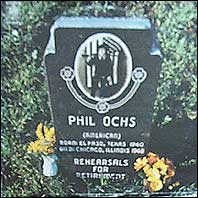Rehearsals for Retirement
| Rehearsals for Retirement | ||||
|---|---|---|---|---|
 | ||||
| Studio album by | ||||
| Released | May 16, 1969 | |||
| Recorded | 1968–69 | |||
| Studio | A&M Studios, Los Angeles | |||
| Genre | Folk rock | |||
| Length | 38:54 | |||
| Label | A&M | |||
| Producer | Larry Marks | |||
| Phil Ochs chronology | ||||
| ||||
Rehearsals for Retirement is Phil Ochs's sixth and final studio album, released in 1969 on A&M Records. Two compilation albums were released after it, in 1970 and 1986, the latter being released posthumously.
Background[edit]
Recorded in the aftermath of Ochs's presence at the 1968 Democratic National Convention in Chicago (where Ochs claimed to have witnessed the symbolic "death of America") it is often considered to be the darkest of Ochs's albums, exemplified not just by the lyrical matter but also by its cover: a tombstone sardonically proclaiming that Ochs had died in Chicago.[1]
Rehearsals for Retirement saw Ochs exploring folk rock, incorporating orchestral accompaniments and electric guitar into his music.[2] According to English studies scholar David Pichaske, songs such as "Pretty Smart on My Part" and "The Scorpion Departs but Never Returns" functioned as "art-protest songs". The former was written from the perspective of a John Birch Society member who is paranoid of switchblade-toting thieves, foreign operatives, dissident hitchhikers, and dominant, large-breasted women, and acts on this paranoia by killing them and others with a rifle and his friends from the National Rifle Association of America (NRA). Pichaske interpreted the narrative as a psychological analysis finding insecurity to be the source of violence in the United States. The latter song used the 1968 disappearance of the Scorpion nuclear submarine as an allegory for a modern "Lost Generation" who abandon the U.S. in response to the Vietnam War.[3]
Reception[edit]
| Review scores | |
|---|---|
| Source | Rating |
| AllMusic | |
| The Village Voice | B[5] |
Rehearsals for Retirement was the poorest-selling of all of Ochs's albums released during his lifetime,[citation needed] having been deleted from the A&M Records catalog before sales of 20,000 units had occurred.
Reviewing for The Village Voice in 1969, Robert Christgau said the musical arrangements are "excellent and work for [Ochs'] voice". While observing "some predictable bummers", Christgau highlighted two flashes of greatness with "The Scorpion Departs But Never Returns" and "Another Age".[5]
In 1998, The Wire included Rehearsals for Retirement in their list of "100 Records That Set the World on Fire (While No One Was Listening)", where the staff praised it "the single most eloquent collection of protest songs in the English language." They further described it as a song cycle where "the political gives way to the existential", with a combination of "angry disillusion and impassioned optimism" that is "entirely disarming."[6] William Ruhlmann, in a retrospective review for AllMusic, felt the album imbued Ochs' poetic sense with "the conflicts of the times", and noted how, with regard to Ochs' 1976 suicide, "it is impossible not to see the evidence of the songwriter's personal anguish in Rehearsals for Retirement.[4]
Track listing[edit]
All songs by Phil Ochs.
Side one[edit]
- "Pretty Smart on My Part" – 3:18
- "The Doll House" – 4:39
- "I Kill Therefore I Am" – 2:55
- "William Butler Yeats Visits Lincoln Park and Escapes Unscathed" - 2:55
- [Untitled] (commonly called "Where Were You in Chicago?") – 0:29
- "My Life" – 3:12
Side two[edit]
- "The Scorpion Departs but Never Returns" – 4:15
- "The World Began in Eden and Ended in Los Angeles" – 3:06
- "Doesn't Lenny Live Here Anymore?" – 6:11
- "Another Age" – 3:42
- "Rehearsals for Retirement" – 4:09
Personnel[edit]
- Phil Ochs – guitar, vocals
- Larry Marks – producer
- Lincoln Mayorga – piano, accordion
- Bob Rafkin – guitar, bass
- Kevin Kelley – drums (rumored)
- Ian Freebairn-Smith – arrangements
References[edit]
- ^ Schumacher, Michael (1996). There But for Fortune: The Life of Phil Ochs. New York: Hyperion. pp. 201, 204, 211. ISBN 978-0-7868-6084-5.
- ^ Chase, Gilbert (1992). America's Music, from the Pilgrims to the Present. Vol. 432. University of Illinois Press. p. 626. ISBN 0252062752.
- ^ Pichaske, David (1994). "Phil Ochs". In De Leon, David (ed.). Leaders from the 1960s: A Biographical Sourcebook of American Activism. ABC-CLIO. p. 424. ISBN 0313029172.
- ^ a b "Rehearsals for Retirement > Review". AllMusic. Retrieved December 15, 2011.
- ^ a b Christgau, Robert (July 10, 1969). "Consumer Guide (1)". The Village Voice. Retrieved October 21, 2017.
- ^ "100 Records That Set the World on Fire (While No One Was Listening)". The Wire. No. 175. September 1998.
Further reading[edit]
- Möhle, Christine (2017). Trials and Tragedies: Phil Ochs and His Rehearsals for Retirement. Hamburg: Tredition. ISBN 978-3-7439-3963-9.
